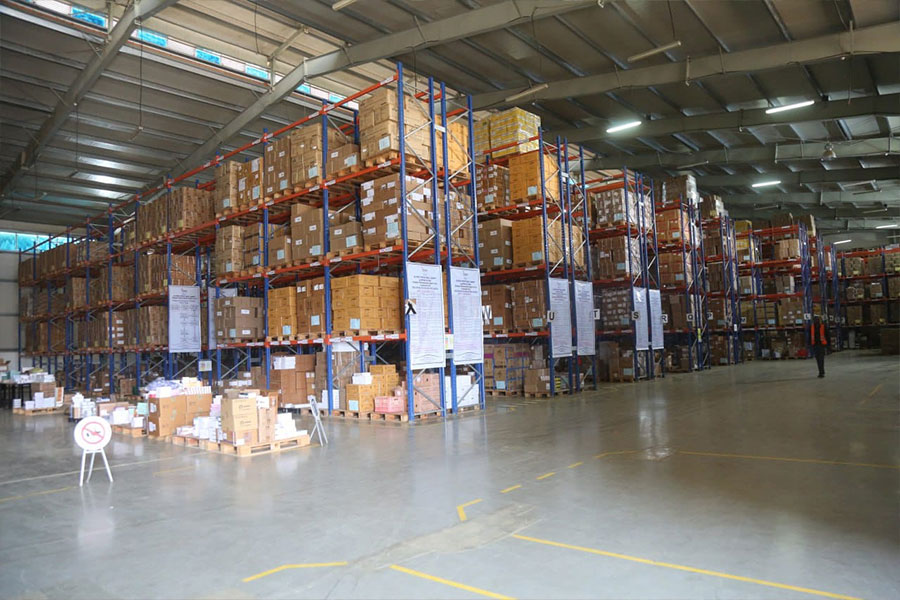
Radar | Dec 11,2021
Feb 2 , 2019
By BERHANE HAILEMARIAM ( FORTUNE STAFF WRITER )
Eight companies are bidding to supply four million quintals of wheat valued at 3.2 billion Br, including a Dubai based trading house that has been suspended from entering into such bids in Ethiopia. Promising International Trading took part in the bidding process last week after securing a court order, which temporarily lifted the injunction order of the Public Procurement & Property Administration Agency against it. The financial offers of Promising International and seven other companies were opened on January 31, 2019, at the premises of the Agency located on King George VI Avenue, around Sidist area.
The Agency had imposed an injunction against Promising International for one year, excluding it from participating in any bid at the Agency. The ban came into effect due to complaints filed after it was alleged the company failed to fulfil a prior contract.
Promising was awarded a contract to supplytwo million quintals of wheat for 1.39 billion Birr last June but failed to deliver the grain, which led to its subsequent suspension. Displeased with the act of the Agency, Promising took the case to the Federal High Court, that lifted the injunction until the case is resolved.
While the case is still pending at the High Court, Promising International took part in the latest bid announced by the Service on behalf of the Ethiopian Trading Business Corporation to be used for market stabilisation. The tender is categorised in four lots, each consisting of one million quintals.
For the bid that was announced a month ago, a total of 38 companies purchased the bidding document, including Promising. However, only eight - Bunge SA, Hakan Agro DMCC, Intrade Co. UK Ltd, ADM International, Ameropa AG, Phoenix, Promising International and A Plus Import jointly with Wifag Mabruk General Trading - submitted their financial offers.
During the financial opening held at the end of last week, A Plus Import and Wifag Mabrouk General Trading placed the lowest bid. A Plus Import, which participated in the bidding process for the first time, was established in 2012 and is based in the United Arab Emirates.
A Plus Import and Wifag Mabrouk offered 270 dollars, 274 dollars, 278 dollars and 284 dollars a tonne for the four lots, respectively. The offers from the other companies range between 299 dollars to 399 dollars a tonne.
“The results of the evaluation will be announced in two weeks,” said Worku Gezahegn, chairperson of the tender committee and strategic goods procurement team leader at the Service. “The committee will also investigate the current status of the ban on Promising and act accordingly.”
If the company has received any proof showing the ban is lifted, it will be considered in the evaluation process. Otherwise, it will be disqualified, according to Worku.
The financial opening was held in the same week when one of the popular bakeries in the capital, Shoa Bakery, doubled the price of the bread it sells. The management of Shoa mentioned that they altered the price as the Corporation, which buys and distributes wheat for market stabilisation, has stopped providing them with milled wheat.
The Ethiopian Trading Business Corporation purchased 10.9 million quintals of wheat valued at 8.5 billion Br two years ago. Last year, the volume declined to 5.9 million quintals procured for five billion Birr, indicating a 46pc decrease in the purchase.
In the local market, a quintal of wheat is sold for 1,474 Br.
The country is investing a huge chunk of money on grain imports while being the largest wheat producer in Sub-Saharan Africa, harvesting over four million tonnes of wheat annually. At the same time, the demand for the grain is growing by five percent annually.
The nation’s wheat consumption stood at 6.4 million tonnes in 2017, while imports filled the deficit.
Woldeamlak Bewqet (Prof.), who has more than a decade of experience in the Department of Geography & Environmental Studies and specialises in research on climate change, condemns the country for not using all the potential it has to cultivate wheat with increased productivity.
Agricultural mechanisation, enhancing the capacity of farmers and conservation practices are required to increase productivity, according to Woldeamlak.
“This way,” said Woldeamlak, “the country becomes self-sustaining.”
PUBLISHED ON
Feb 02,2019 [ VOL
19 , NO
979]

Radar | Dec 11,2021

Radar | May 11,2019

Radar | Feb 27,2021

Fortune News | Jan 03,2025

Radar | Apr 10,2021

Radar | Oct 22,2022

Radar | May 29,2021

Commentaries | Jan 03,2021

Viewpoints | Jun 11,2022

Radar | Aug 17,2019

Dec 22 , 2024 . By TIZITA SHEWAFERAW
Charged with transforming colossal state-owned enterprises into modern and competitiv...

Aug 18 , 2024 . By AKSAH ITALO
Although predictable Yonas Zerihun's job in the ride-hailing service is not immune to...

Jul 28 , 2024 . By TIZITA SHEWAFERAW
Unhabitual, perhaps too many, Samuel Gebreyohannes, 38, used to occasionally enjoy a couple of beers at breakfast. However, he recently swit...

Jul 13 , 2024 . By AKSAH ITALO
Investors who rely on tractors, trucks, and field vehicles for commuting, transporting commodities, and f...

Oct 25 , 2025
The regulatory machinery is on overdrive. In only two years, no fewer than 35 new pro...

Oct 18 , 2025
The political establishment, notably the ruling party and its top brass, has become p...

Oct 11 , 2025
Ladislas Farago, a roving Associated Press (AP) correspondent, arrived in Ethiopia in...

Oct 4 , 2025
Eyob Tekalegn (PhD) had been in the Governor's chair for only weeks when, on Septembe...